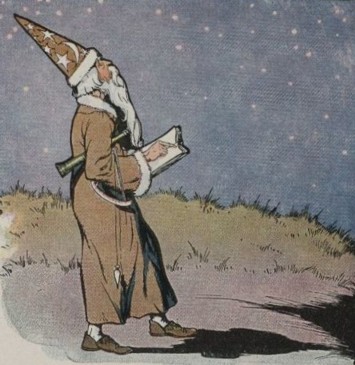| 1. gaze | /GEYZ/ |
| -to look for a long time at something or someone or in a particular direction | |
| The girl gazed at the sunset while appreciating its beauty. | |
| 2. slippery | /SLIP-e-ri/ |
| -smooth and wet and difficult to hold or walk on | |
| A slippery road may cause accidents. | |
| 3. muddy | /MAD-i/ |
| -covered by or containing mud | |
| She played outside and came back with her clothes muddy. | |
| 4. fail | /feyl/ |
| -to not be successful | |
| She failed to do her household chores for the day, so her mom talked to her. | |
| 5. climb | /klaym/ |
| -to go up, or to go toward the top of something | |
| She climbed the mountain to refresh her mind. |

One evening he was walking along the open road outside the village. His eyes were fixed on the stars. He thought he saw there that the end of the world was at hand, when all at once, down he went into a hole full of mud and water.
There he stood up to his ears, in the muddy water, and madly clawing at the slippery sides of the hole in his effort to climb out.
His cries for help soon brought the villagers running. As they pulled him out of the mud, one of them said:
“You pretend to read the future in the stars, and yet you fail to see what is at your feet! This may teach you to pay more attention to what is right in front of you, and let the future take care of itself.”
“What use is it,” said another, “to read the stars, when you can’t see what’s right here on the earth?”
Take care of the little things and the big things will take care of themselves.
| 1. | What was the Astrologer trying to do? |
| 2. | What happened while he was gazing at the stars? |
| 3. | What did the villagers tell him? |
| 1. | Why do you think the Astrologer was very fond of the stars? |
| 2. | Do you think the villagers were correct with what they told to the Astrologer? Why or why not? |
| 3. | What do you think the Astrologer realized after the incident? |
| 4. | Do you agree with the moral of the story? Why or why not? |
| 5. | What may be the effect if we keep on missing the little things because of trying to go after the big things? Please explain your answer. |
| Grammar 文法 |
Pronunciation 発音 | Vocabulary 単語 |
Comprehension 理解 |
|
|---|---|---|---|---|
 GOOD GOOD |
文法の誤りはほとんどなく、完全な文章で話すことができる | ほとんどの単語をはっきりと正しく発音することができる | 習った表現を適切に使うことができる | 文章を理解し、質問に正しく答えることができる |
 FAIR |
文法の誤りはあるが、完全な文章で話すことができる | 発音の練習が必要な言葉がいくつかある | たまにミスはあるが、習った表現を適切に使うことができる | 文章を完全に理解するのは難しく、質問に正しく答えられないときもある |
 POOR |
文章で話すのは難しく、単語だけで話すことができる | 発音の練習が必要である | 習った単語と表現を少しだけ使うことができる | 文章を理解するのは難しく、質問に答えるのは難しい |
An eBook from The Project Gutenberg.
This eBook is for the use of anyone anywhere at no cost and with almost no restrictions whatsoever. You may copy it, give it away or re-use it under the terms of the Project Gutenberg License included with this eBook or online at www.gutenberg.org